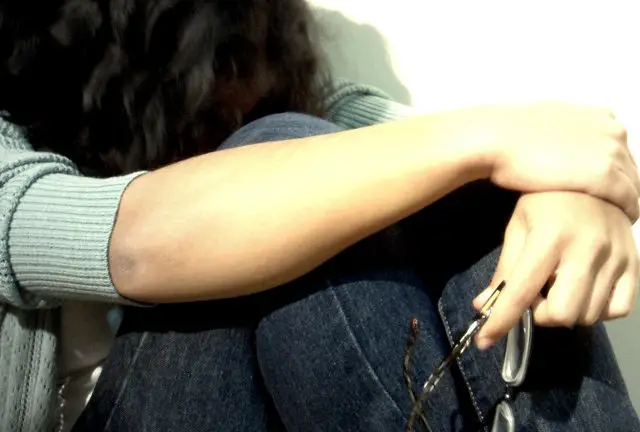Colleen Brannon has launched a petition calling on the Isle of Wight council to rethink their plans to close the Mental Health Day centres and shares this personal and heartfelt plea to Islanders for support on behalf of all those suffering with mental health issues. Ed
The IWCC should provide more help for Islanders suffering with mental illness – not cut the limited provision we do have.
I sincerely hope you make it through your entire life never needing any treatment for mental illness, but the chances are you might. I hope you never have to watch powerlessly as someone you love suffers, tormented by their own thoughts, but the chances are, you will.
1 in 4 people suffer
We’ve had enough ‘mental health awareness days’ to know one in four people suffer with a mental health problem in the UK every year.
In our country, four million people use antidepressants long-term, and in 2017, 6,213 people committed suicide. This does not include the many thousands of others who attempted suicide, but survived. The likelihood is, you will, if you haven’t already, be affected in some way by mental illness
Couldn’t believe the plans
When I first heard the council are proposing closing three Mental Health Day Centres, I thought I’d misunderstood.
Having previously worked on the Island for many years as a support worker for people with mental health problems, being a former service user myself and having supported loved ones through mental illness, I could not imagine it isn’t glaringly obvious to anyone who has anything to do with our Island community that we are in desperate need of more mental health provision, not less.
Incredible it’s being considered by councillors
It seems incredible that any rational Councillor with open eyes who cares about people here and who understands how health is integral to everything else (employment, housing, family life etc) would even consider closing these centres.
I am rarely surprised when I hear of yet more cuts to services; I’ve developed a reluctant expectance, but this one has incensed me.
I am so sick of witnessing the books being balanced on the backs of some of the most vulnerable people. If the day centres are gone, where will the people who use them go? What will happen to them?
Too many already suffering
There are already too many people here, suffering and in incredible mental anguish, who are not receiving the help, support and treatment they need to get better.
They are given a crisis number, some drugs, and are left waiting for treatment on referral lists for years. During this time, it’s highly likely the condition will become worse and the consequences of it dire – family breakdown, loss of job and home, self-harm, suicide, addiction, all making the initial problem harder to manage. If we treated cancer patients like this, the world would respond furiously, and quite rightly, too.
A perfect storm for a crisis in mental health
Nothing happens in a vacuum, and austerity cuts to other essential services (for example, cuts to youth services, to social care and education) have created a perfect storm for a crisis in mental health.
How could anyone seriously believe that cutting these day centres will save money? Not providing proper, timely, accessible and effective treatment for people suffering with mental illness not only demonstrates a lack of real understanding or compassion, but it’s also very expensive in the long term.
Already dangerously inadequate
Mental health provision on the Island is already shockingly, dangerously inadequate.
This is another cut that could seriously harm the well-being of vulnerable Islanders, and will ultimately be very expensive, because it costs a lot more money to repair a family or a community after a catastrophe, than it does to prevent one.
Generations to come will pay for these cuts, if they go ahead.
Effects of mental illness ripple outwards
Mental illness does not just affect the person suffering from it, although it does affect them most severely of course. The effects of mental illness ripple outwards like drops of water in a pond.
Families and whole communities can be impacted. Responding appropriately to mental health issues as a society does not just benefit the person with the problem, but benefits us all, helping us to be a safer, more prosperous community.
The ‘most stable’ people can be affected
Mental illness can happen to anyone. A few years ago, one of the strongest, most hardworking and most stable people I know had a breakdown.
Post-Traumatic Stress Disorder meant he went from being someone most people would consider to be successful, to not being able to put his own socks on.
There was barely any help, even with me fighting his corner (some people do not have loved ones to advocate for them), and if these cuts go ahead, there will be even less, and it will be even more difficult to address.
Those without support at risk
I often worry about people, in great pain or under severe stress, trying to navigate the system and get the support they need, when they need it.
It is difficult to understand if you’ve never been there (and I hope you haven’t), but for those of us who have suffered with mental ill-health, sometimes getting out of bed can seem a terrifying and insurmountable task.
It’s an illness
It’s not that we don’t want to, but that we don’t feel we are capable of doing it; even as it is happening there is a (very frustrated) part of us that knows it is ridiculous (it’s just getting out of bed for goodness sake!) but knowing that doesn’t change the feelings, the fear, the anxiety, the despondence, the pressure, the pain – it is impossible.
It is illness, and we cannot just ‘be well’.
Unrealistic expectations on patients
If getting out of bed is a very difficult sometimes impossible task, how are people in this condition meant to seek out and manage their own care and treatment?
It’s not realistic, and it’s why the drop-in services offered by these day centres are so necessary.
Drop-in centres offer solutions and support
Mental illness fluctuates, there are good days and bad days, some days a person might be more in control than the illness, and on those days might feel able to face people, to seek treatment, to imagine things could be better, on others days this is not possible.
Because of this fluctuation, people suffering with mental health issues can sometimes seem chaotic and unreliable, and a drop-in centre offers a solution, because it is a really low-key – there are minimal demands of a patient who only needs to come if they feel up to it in that moment.
Pressure minimised and stability maximised
Pressure is minimised and stability and security maximised with the knowledge that there is help available and accessible, should it be needed.
This is incredibly valuable to someone in despair.
Millions of pounds of local cuts to services
The council keep making terrible cuts, saying ‘it won’t affect services’ as they do.
Despite being told by our Prime Minister that austerity is over, we are still in the midst of millions of pounds worth of cuts to local services, and we are constantly being asked by the council to believe that these cuts won’t make a difference to the services we receive.
Cuts DO matter
Do they think we’re stupid? If these millions of pounds didn’t improve the quality and quantity of services in the first instance, then why have we been paying for them for years? Utter b****cks.
These cuts DO matter. People, some of them very poorly, WILL suffer as a result and some will not receive the timely and effective help they need to get better.
Personal Assistants will surely cost more?
The council say they will replace the services the day centre offers with Personal Assistants and the like.
Even if you believe this (and I simply do not), there are 100s of people on the books of the centres marked for closure, and to provide them all with PAs would surely cost more than the £145,000+ the council think these cuts will save them (£145,000 is slightly more than the money the council just spent on a PFI highway consultant for eight months), PAs will not be suitable for every patient and there should be a wide and varied range of treatments available.
Personal experience
I cannot stress how profoundly we need your help. When I was in the deep, dark hole of mental illness, I would not have been able to fight cuts like these.
People for whom these brutal cuts are likely to affect the most, are the least likely to be able to stand up and fight for the help they desperately need.
That’s why it’s up to you and me to do it.
Send a strong clear message to IWC
That’s why I implore you to please, please consider signing and sharing this petition. We need to send a strong, clear message to the IWCC, saying we will not accept these cuts and we will not stand idly by whilst vulnerable people are failed over and over again.
Once we have over 2,000 signatures, I will be able to present this petition and confront the council about these cuts in a council meeting.
Duty and responsibility to help Islanders suffering
I wish I could promise what we do will be effective and the centres will remain open, but I cannot promise that. I do think that we have a duty and a responsibility to all our fellow Islanders suffering with mental health problems to try.
I am incredibly grateful to the 350+ people who have already supported the petition in just a few hours, demonstrating that we are a compassionate, kind and loving community.
Sign the petition
Please sign the petition, share and ask your friends to sign it too.
Thank you. I’ll keep you updated.
Image: Kiran Foster under CC BY 2.0





